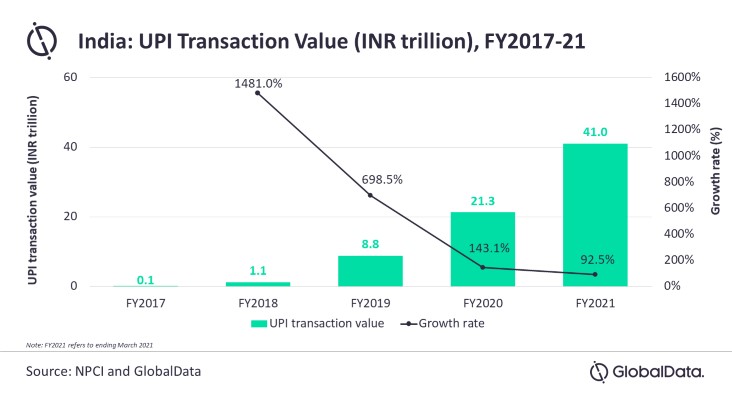The approval of new umbrella entities (NUE) licensing by the Reserve Bank of India (RBI) will lead to increased private participation in the Indian digital payments space, which is currently dominated by state-owned National Payments Corporation of India (NPCI) via its UPI payment system, according to GlobalData, a leading data and analytics company.
To further develop digital payment infrastructure and increase competition RBI introduced framework for entry of private players for retail payments in August 2020. The framework enables private companies to apply for NUE license and create a retail payment system against UPI.
Shivani Gupta, Banking and Payments Senior Analyst at GlobalData, comments: “With rising digital payments, granting NUE license to private players will ease payment settlement burden on NPCI and stimulate competition.”
Unlike NPCI, which is a non-profit entity, NUE will be for profit, enabling entities to charge fees for online transactions. This has attracted big Indian business houses like Reliance and Tata, as well as global giants like Amazon, Facebook and Google.
In this regard, on 31 March 2021 six consortiums led by Reliance Industries, Tata Group, Axis-ICICI Bank, Paytm, India Post, and fintech startup iserveU submitted their applications to the RBI for license. For example, the consortium led by Axis and ICICI Bank include include BillDesk, Pine Labs, Amazon and Visa. Similarly, Google and Facebook are part of the consortium led by Reliance Industries.
The advent of UPI payment platform in 2016 accelerated digital payments adoption in India, which is predominantly cash driven. UPI has been a game changer with large volume of day-to-day cash transactions now shifting to UPI based payments. It allows consumers to make payments conveniently and quickly from mobile phone using recipients mobile number or QR code without sharing any financial data.
According to NPCI, UPI transactions grew exponentially from INR69.5bn (US$951.52m) in FY2017 to INR41.0 trillion (US$561.57bn) in FY2021. While transaction volume increased from 17.9 million in FY2017 to 22.3 billion in FY2021. To address the risk concentration of such large number of transactions on only one platform and to offer options to consumers, the central bank invited private companies to bid for license to set up a new payment platform.
 Gupta concludes: “The surge in smartphone penetration, rising payment infrastructure particularly QR code among merchants and the availability of mobile payment solutions have helped consumers embrace digital payments in recent years. The entry of NUEs will further intensify competition and increase innovation in digital payment space. However, risks around consumer financial data are something that needs to be addressed to gain trust from customers.”
Gupta concludes: “The surge in smartphone penetration, rising payment infrastructure particularly QR code among merchants and the availability of mobile payment solutions have helped consumers embrace digital payments in recent years. The entry of NUEs will further intensify competition and increase innovation in digital payment space. However, risks around consumer financial data are something that needs to be addressed to gain trust from customers.”


